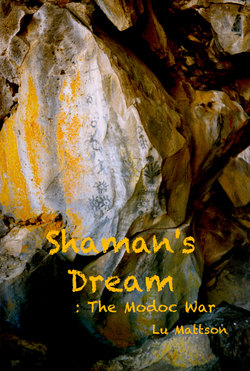Читать книгу Shaman's Dream: The Modoc War - Lu Boone's Mattson - Страница 40
На сайте Литреса книга снята с продажи.
#36
ОглавлениеHe had spent days talking and listening, making laws, marrying and divorcing, naming babies, settling difficulties. When at last he was ready to leave the agency, the Klamaths had started out with him, telling him to come next summer and stay one moon and make laws, build the mills, tell them about his religion. All of it he promised.
All things considered, the year had not been a bad one. He wouldn’t want to say it, but as he left the agency and turned his horse into the track toward Ashland and, beyond it, Salem and home, he had the feeling that for the first time in his life he had laid his hands on his destiny. It was as if he had only been waiting all these years while his life was being made ready. The life that had seemed so delayed unwound cheerily now before him.
He had humbled himself and his family ripping sod, raising sheep, breaking and maintaining toll roads, feeding and housing the miners crossing to the gold-fields in Idaho. He had turned his hand ungrudgingly to all kinds of toil, figuring that was what was asked of him to prove that he was worthy. He had prepared himself for it.
Forty-four: a ripe age, and it had taken this long to feel as if the life he was living was his own. He had not gotten to this moment of achievement one second too soon.
A new year, and time for promises and stock-taking. So much had been good: the fortune, for instance, that had taken him to Washington. Last month the President had finally decreed his Quaker Policy to the Congress, and it pleased Meacham to think that he was part of the general improvement. What had happened here might serve as an instance in the disputes the policy was causing. The establishment must see that settling the Indians in peace -- and dignity -- was in their and the settlers’ best interests, too. How else did they expect to go forward in this region, for example, with all the plans for development? Draining lands and diverting rivers and designing settlements was easy enough to caucus about at a distance, but how did they expect to put their plans through unless the Indians would cooperate?
And where they were concerned, would they prefer extermination? He did not think so, so the president’s policy must work. He had made his Big Talks with them, and they were learning what they must change to turn their Indian hearts into white ones.
It was as if lines of convergence had brought everything to this point: the settlers surging here from all directions, by every means that could be imagined. Foot, beast, wagon, ship, now train. Every one and all things were in motion toward this moment of time. To create something out of the dreams that had held the seekers through every dismal moment to bring them here. He did not believe in predestination, but he could understand its appeal. The evidence sometimes seemed so clearly to point toward it, as it did now, in this wide-open space.
If it was not too predestinarian of him, he saw smaller patterns of convergence, too: of himself and Knapp, of them and the Applegates, of all of them with the settlers and the Indians. It was indeed as if some giant plan were being unfolded over the face of the land, with each one finding his appointed place in it, as he had found his. A tapestry was being woven. In his enthusiasm for this life he had been given he was growing metaphorical, but how else could he express it -- to anyone, including himself?
He tipped his hat back on and touched his heels to the bay’s flanks, glad to be out on a morning such as this in the new year, headed for Orpha and home. The horse skittered, as if surprised to be summoned from wherever its horse-dreams had taken it, but eager and willing, pleased to be called on to plunge forward. His bay stepped quickly in the bright morning, as glad as he was to have his head set toward home. High time! he seemed to be saying. Meacham took off his hat and set a new crease in the crown of it. He ran his hand through his thinning hair, feeling the sun through his coat on his shoulders.
It was deeply satisfying, Meacham said to himself, to find oneself finally brought to a life of service.
